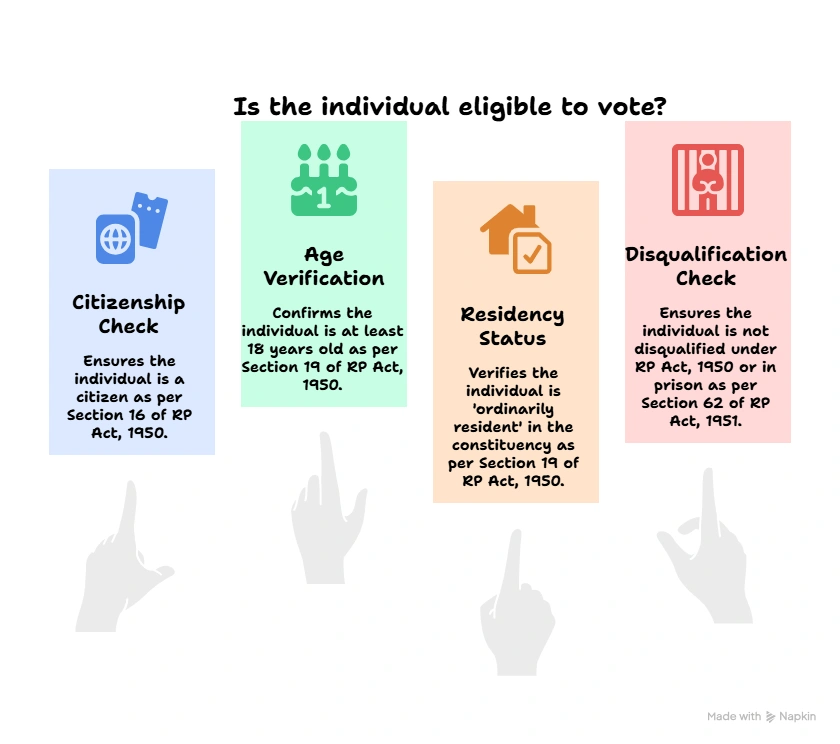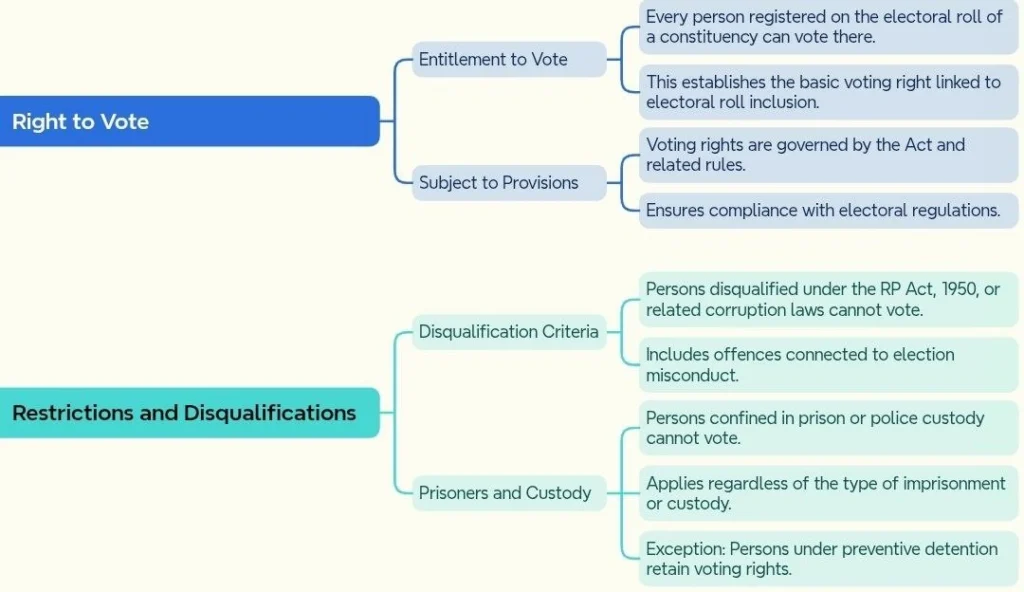Paper: GS – II, Subject: Polity, Topic: Rights Issues, Issue: Right to Vote.
Context:
The Supreme Court is reviewing petitions challenging the Special Intensive Revision of electoral rolls in Bihar. A key issue in the case is the legal and constitutional status of the “right to vote” and its protection under Indian law.
Key Takeaways:
Universal Adult Suffrage:
- India chose immediate universal adult suffrage from the beginning, ensuring voting rights for all citizens, unlike many countries that granted it slowly.
- Constitutional Guarantee: Article 326 granted voting rights to all adults, regardless of gender, caste, religion, education, or property.
- The voting age was later reduced from 21 to 18 through the 61st Amendment in 1989.
Legal Framework Two laws support this right:
- The Representation of the People Act, 1950 for preparing electoral rolls.
- The Representation of the People Act, 1951 for regulating elections and addressing offences.
Administrative Innovations:
- To include 173 million largely illiterate voters, election symbols were introduced by Chief Election Commissioner Sukumar Sen, making voting easier for all.
- The Election Commission ensures that every citizen, no matter how remote, can exercise their right to vote a core pillar of India’s democracy.


Judicial Pronouncements on the Right to Vote:
The legal status of the right to vote has been debated in various cases:
- N.P. Ponnuswami Case (1952): A Constitution Bench of the Supreme Court held that the right to vote is a statutory right and subject to limitations imposed by it.
- Jyoti Basu Case (1982): The court reiterated that the right to vote is neither a fundamental right nor a common law right but a simple statutory right.
- PUCL Case (2003): Justice P.V. Reddy observed that the right to vote, if not a fundamental right, is certainly a ‘constitutional right.’
Constitutional Right vs. Statutory Right:
In India, the ‘right to vote’ is not a fundamental or constitutional right but a statutory right under Section 62 of the Representation of the People Act, 1951.
The difference between a constitutional right and a statutory right lies in their source and the manner of their enforcement:
- Constitutional Right: A right that is explicitly mentioned in the constitution of a country. It can be a fundamental right (part of the constitution that cannot be easily amended) or other constitutional rights.
- Statutory Right: A right that is granted by a statute (a law passed by a legislature). It can be amended or repealed by the legislature that created it.
Section 62 of the Representation of the People Act, 1951:

Conclusion:
- While the Supreme Court has consistently held the right to vote as a statutory right, the debate continues, with some judges suggesting it could be considered a constitutional right.
- The right is enshrined in Article 326 of the Constitution and operationalized through the RP Acts, ensuring universal adult franchise subject to certain qualifications and disqualifications.
La Excellence IAS Academy, the best IAS coaching in Hyderabad, known for delivering quality content and conceptual clarity for UPSC 2025 preparation.
FOLLOW US ON:
◉ YouTube : https://www.youtube.com/@CivilsPrepTeam
◉ Facebook: https://www.facebook.com/LaExcellenceIAS
◉ Instagram: https://www.instagram.com/laexcellenceiasacademy/
GET IN TOUCH:
Contact us at info@laex.in, https://laex.in/contact-us/
or Call us @ +91 9052 29 2929, +91 9052 99 2929, +91 9154 24 2140
OUR BRANCHES:
Head Office: H No: 1-10-225A, Beside AEVA Fertility Center, Ashok Nagar Extension, VV Giri Nagar, Ashok Nagar, Hyderabad, 500020
Madhapur: Flat no: 301, survey no 58-60, Guttala begumpet Madhapur metro pillar: 1524, Rangareddy Hyderabad, Telangana 500081
Bangalore: Plot No: 99, 2nd floor, 80 Feet Road, Beside Poorvika Mobiles, Chandra Layout, Attiguppe, Near Vijaya Nagara, Bengaluru, 560040
